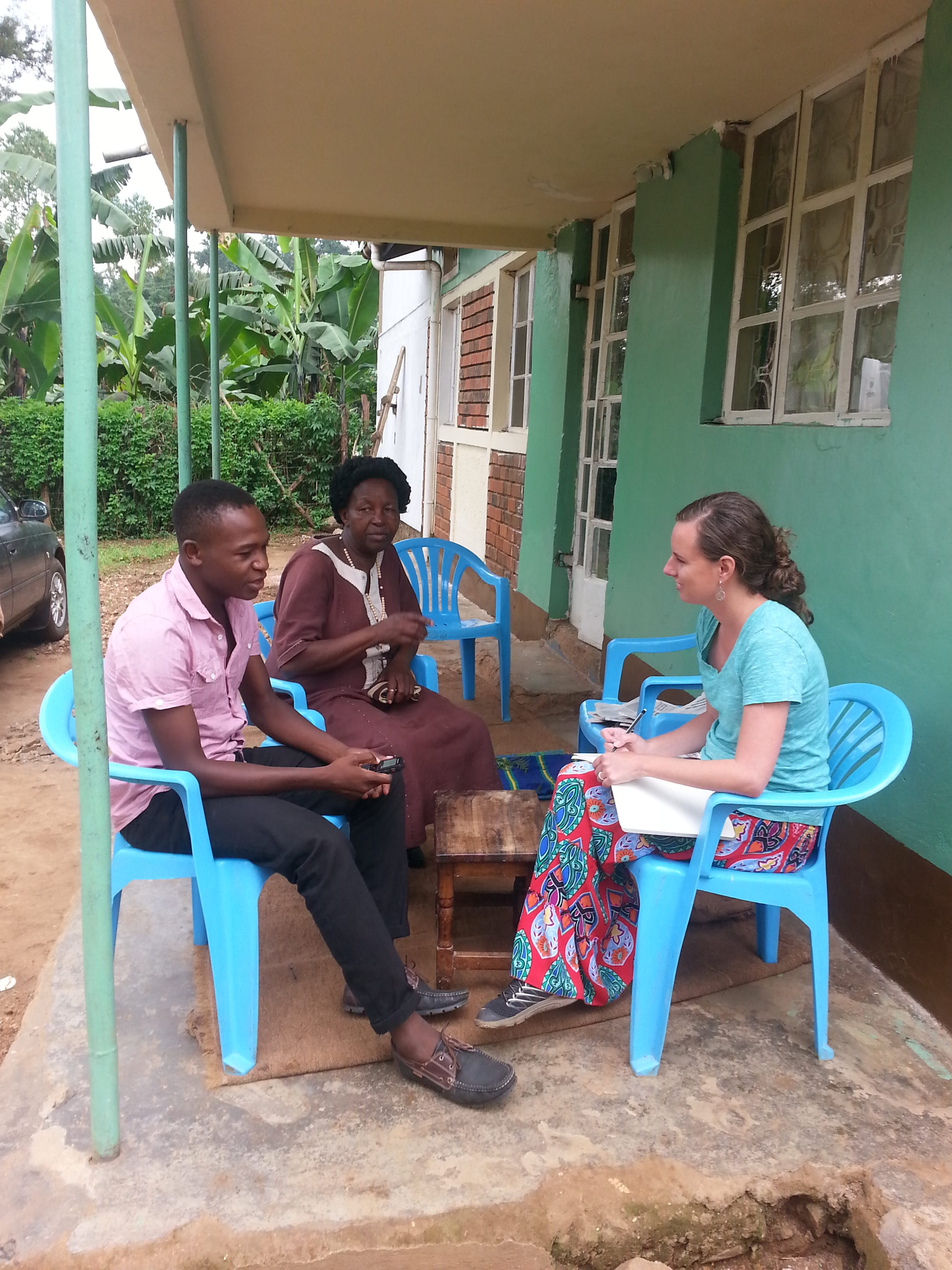Kelly Austin is an Assistant Professor of Sociology at Lehigh. She is in Bududa, Uganda this summer with a group of students pursuing her research in community health. You can read her first post here.
So let’s talk infrastructure. We stay with a local family, the Zaales. David Zaale is around 70 years old and has lived in Bududa his entire life (except for when he was forced to temporality relocate to Kenya for several months during the Amin era). David and Elizabeth Zaale have several children, the eldest is in her 40s, and the youngest, Dezz Zaale is in his 20s.
The Zaale compound is extremely nice and well-developed compared to the other homes in Bududa, which tend to be made of mud and dung (both inside and out). While we benefit from having brick walls, cement floors, and some paved “sidewalks” that connect the guest rooms, other conditions are a bit more rugged. There is no running water, and the electricity is very spotty. We use pit latrines and take “bucket baths”, where we use water that is harvested from the river to douse ourselves clean (or clean-ish). As I wrote in the last post, the roads are very bad here, you are either fighting dust or mud, and it takes about 1 hour to go ~12 miles. We most often walk to where we need to be.
from having brick walls, cement floors, and some paved “sidewalks” that connect the guest rooms, other conditions are a bit more rugged. There is no running water, and the electricity is very spotty. We use pit latrines and take “bucket baths”, where we use water that is harvested from the river to douse ourselves clean (or clean-ish). As I wrote in the last post, the roads are very bad here, you are either fighting dust or mud, and it takes about 1 hour to go ~12 miles. We most often walk to where we need to be.
We are lucky enough to have 3 house ladies (or silent soldiers, as I like to call them) who work all day long, fetching us water, cleaning the rooms and latrines, cooking our food, washing our clothes in the river, washing dishes, etc. Of course, many members of the Zaale family chip in on these tasks, including Elizabeth herself. As I often notice here, the women work so hard all day long. Tirelessly hand plowing in the gardens, collecting fire wood, picking stones from uncooked rice, and tending their children.
Since we arrived in Bududa, we have had electricity about half of the time. We are in a bad stretch right now, having been without electricity for about 4 days. Of course, this makes working and doing research a bit challenging. Fortunately, Papa David Zaale has a generator (one of the only ones in the village) that he turns on for us for about 3-4 hours per evening so we can charge our computers, audio recorders, and phones. However, if we all plug in at once, it overloads the generator. So, it is a bit of a shuffle and negotiation of whose devices get priority in charging, based on what tasks each of us need to do the following day.
Another challenge to work here can be the noise. With so many people around the compound, including extended family members, young grandchildren, and infants of the house ladies’, the level of crying, playing, singing, and talking can be a bit intense sometimes. And Ugandans love music. The students and I sometimes sneak into the garden to find a quiet spot to do our interviews (when they are not at a health center or a community members’ house), and we’re trying to institute a couple of “quiet” hours from 3-5 in the afternoons to do the transcribing. Transcribing involves typing out word for word everything that was said in the interview from the audio recording. Transcribing typically takes about 3-4 times longer than the actual interview itself. While this task is arduous and time consuming, it is an absolutely necessary step of the qualitative research process.
Dezz Zaale is one of our key translators and community liaisons. Papa Zaale has amazing connections to many administrators and health workers in the district, as he was an educator in Bududa for over 50 years and Elizabeth has served in local political positions. Each year, Papa uses his connections to help us expedite the process of getting clearance from the District Health Officer to do research in the health facilities. Though, this still usually takes hours of sitting and waiting for an appointment or chance to talk to the DHO and get her rubber stamp of approval. Dezz does the hard work on the ground of securing community members, interview times and locations for us, as well as helping us to refine our interview guides before each interview to ask questions in culturally appropriate ways or ways that will make sense to the local population. Without the help and support of the Zaale family, my research would not be possible. I am deeply appreciative of all they have done to support my work and provide meaningful experiences for the students.
